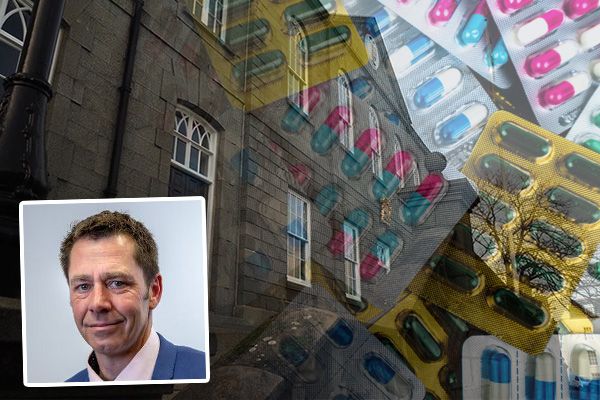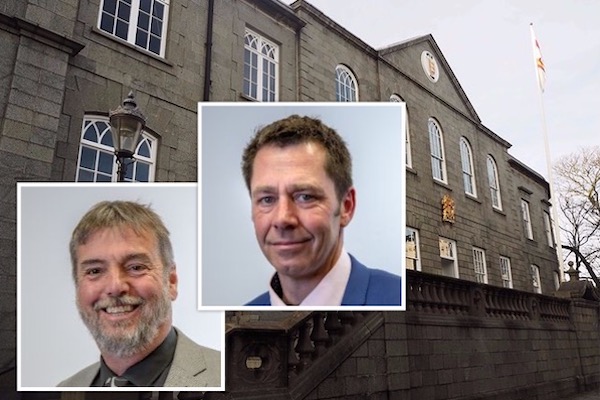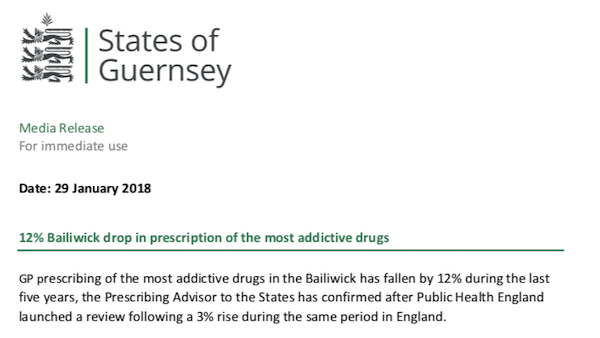

A Deputy has called the States "the biggest drug dealer in the island" during a passionate plea to stop doctors "handing out pharmies like sweets."
Deputy Marc Leadbeater referenced the "number of people in Guernsey who have been killed by prescription drugs during the last ten years or so" describing it as "totally unacceptable" as he pleaded with the island's government to start funding more lifesaving drugs while cutting the number of prescriptions for other "mainly opiate based drugs."
He was speaking out during the debate earlier this week on how medicines are funded in the island, which was led by Deputy Peter Roffey who wanted Bailiwick patients at the least to be able to have the same opportunities to receive treatments available on the NHS if they are referred to the UK for their care.
Deputies Heidi Soulsby and Michelle Le Clerc won an amendment against that debate meaning the Committee for Health and Social Care is now committed to reviewing the funding of drugs, treatments and devices.

Pictured: Deputies Heidi Soulsby and Michelle Le Clerc.
Both the Health and Social Care and Employment and Social Security presidents also said that NICE recommended medicines should be available to patients here.
But Deputy Leadbeater is concerned that while lifesaving drugs have been hard to come by for some people, others have found it easy to get their hands on "pharmies."
Deputy Leadbeater gave a short, sharp speech during Wednesday's States meeting when the Roffey requete was debated and then passed in its amended form. While Deputy Roffey had spoken of his friend, former Deputy Wendy Morgan, who passed away recently, saying she was "appalled" at the local situation, which meant she had to pay thousands of pounds for medicine which her doctor had recommended, Deputy Leadbeater cast a spotlight on the apparent widespread nature of prescribing pharmaceutical drugs which are known to be addictive and harmful.

Pictured: Deputies Peter Roffey and Marc Leadbeater.
Deputy Leadbeater said it has been "common practice in Guernsey for many years now to quite happily dish out prescription drugs like Trammadol, Gabapentin, Diazepam, Nitrazepam, Bupamorphine, Suboxone, Subutex, Fentynol – life taking drugs. But we won’t fund those life giving drugs on the NICE list.
"GP’s dish out pharmies like sweets on a daily basis. Some of these, mainly opiate based drugs, are then sold, and some are traded for other drugs. These drugs have become a currency on their own. This process is happening today and it will happen again tomorrow. Until we do something about this, the problem will just keep on growing, and more and more vulnerable members of our society will become addicted to the opiates that we fund, and that we supply.
"Sir the States is the biggest drug dealer in the island, but unlike other dealers we don’t want to make any money out of it, we’re quite happy to fund the growth of this killer drug problem."
Deputy Leadbeater supported the requete, which was successful enough to lead to a review of how 'life saving' drugs are funded in Guernsey, but he also called for the doctors to be "reined in" and stopped from prescribing certain drugs so often. He said the States should spend money saving lives and HSC should try and stop so many people taking 'life taking drugs'.
"To refuse to fund the lifesaving drugs on the NICE list whist continuing to fund and feed the underground pharmaceutical market is just preposterous. We have got the balance completely wrong. I’m not saying that supporting these proposals will completely redress that balance but what it will do is focus us on the medication that our society needs – the lifesaving drugs – and hopefully the Committee for Health & Social Care will consider looking at ways to curb the problems associated with the prescription of the life taking drugs, such as those I mentioned earlier in my speech."
Wary that some people may disagree with his views, as some deputies did, Deputy Leadbeater told the Bailiff they are "out of touch" and he referenced those people whose lives have been lost to prescription drugs.
"Sir, some members may not agree with me that the prescription drug black market is as large and dangerous as I say it is. Well Sir they are clearly completely out of touch with the reality for many people within our society. The young children being raised by parents who are zoned out on opiates from when they wake until when they go to sleep – the unfortunate children whose parents one day won’t wake up. The number of people in Guernsey who have been killed by prescription drugs during the last ten years or so is totally unacceptable – and what have we done about it? Sweet F A.
"Let’s stop procrastinating and complaining about the cost and give this Requete, as amended, our full support."
You can read Deputy Leadbeater's speech in full here.
Deputy Leadbeater's comments have been refuted by others, including the Employment and Social Security President, Deputy Michelle Le Clerc.
Guernsey's Prescribing Advisor, Geraldine O’Riordan, sent Express a statement first issued in January this year, which said the number of prescriptions of the most addictive drugs issued in the Bailiwick has fallen by 12% during the last five years.
That compared to a rise of 3% during the same time frame in England.

Pictured: A statement released in January touched on the number of drugs prescribed by GPs in Guernsey.
"Prescribing data, at individual doctor level and produced by the Prescribing Support Unit, has been circulated on a regular basis," Ms O'Riordan said. "Primary Care Prescribing Guidelines on prescribing on sedatives and anti-anxiety drugs were first produced in 2005 and on opioids in 2008. These have been backed up by many other measures including, but not limited to, hospital policies, workshops, bulletins, meetings and increasing intelligence about diversion onto the black market. We’re fortunate to have had such engagement from all concerned; secondary care specialists, primary care and colleagues in law enforcement. I believe that this unified approach has led to a very welcome reduction in prescribing."
Ms O'Riordan admitted in January that some people were affected by prescribed drugs. An issue Deputy Leadbeater has now said has not changed.
"The healthcare community however remains very concerned about the prescribing of these drugs," said Ms O'Riordan in January. "Sadly many of the patients who are now addicted to these drugs will have been prescribed them for a health problem. They now find themselves dependant on the drug, or suffering from withdrawal when supply is stopped. However it is important to remember that many patients will be using them appropriately and nobody should stop taking a prescribed drug without speaking to their doctors."
Following this week's debate, HSC has been tasked with reviewing the availablility of all drugs, treatments and devices approved by NICE (the governing body in the UK) and its findings should be back before the States for another debate "no later than the end of the second quarter of 2019."
Pictured: Deputy Marc Leadbeater has accused the States of being a "drug dealer".
Comments
Comments on this story express the views of the commentator only, not Bailiwick Publishing. We are unable to guarantee the accuracy of any of those comments.